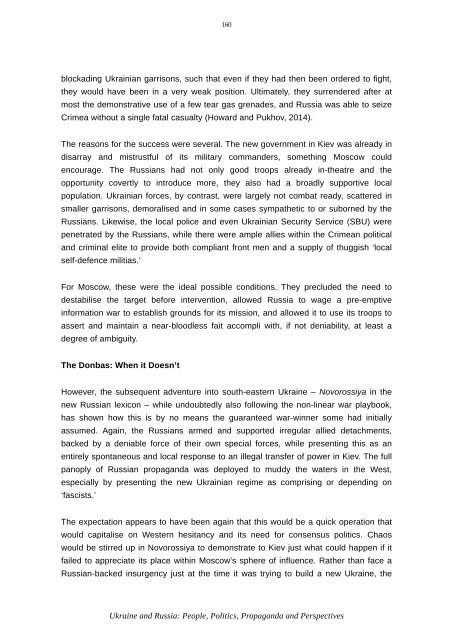Ukraine-and-Russia-E-IR
Ukraine-and-Russia-E-IR
Ukraine-and-Russia-E-IR
Create successful ePaper yourself
Turn your PDF publications into a flip-book with our unique Google optimized e-Paper software.
160<br />
blockading Ukrainian garrisons, such that even if they had then been ordered to fight,<br />
they would have been in a very weak position. Ultimately, they surrendered after at<br />
most the demonstrative use of a few tear gas grenades, <strong>and</strong> <strong>Russia</strong> was able to seize<br />
Crimea without a single fatal casualty (Howard <strong>and</strong> Pukhov, 2014).<br />
The reasons for the success were several. The new government in Kiev was already in<br />
disarray <strong>and</strong> mistrustful of its military comm<strong>and</strong>ers, something Moscow could<br />
encourage. The <strong>Russia</strong>ns had not only good troops already in-theatre <strong>and</strong> the<br />
opportunity covertly to introduce more, they also had a broadly supportive local<br />
population. Ukrainian forces, by contrast, were largely not combat ready, scattered in<br />
smaller garrisons, demoralised <strong>and</strong> in some cases sympathetic to or suborned by the<br />
<strong>Russia</strong>ns. Likewise, the local police <strong>and</strong> even Ukrainian Security Service (SBU) were<br />
penetrated by the <strong>Russia</strong>ns, while there were ample allies within the Crimean political<br />
<strong>and</strong> criminal elite to provide both compliant front men <strong>and</strong> a supply of thuggish ‘local<br />
self-defence militias.’<br />
For Moscow, these were the ideal possible conditions. They precluded the need to<br />
destabilise the target before intervention, allowed <strong>Russia</strong> to wage a pre-emptive<br />
information war to establish grounds for its mission, <strong>and</strong> allowed it to use its troops to<br />
assert <strong>and</strong> maintain a near-bloodless fait accompli with, if not deniability, at least a<br />
degree of ambiguity.<br />
The Donbas: When it Doesn’t<br />
However, the subsequent adventure into south-eastern <strong>Ukraine</strong> – Novorossiya in the<br />
new <strong>Russia</strong>n lexicon – while undoubtedly also following the non-linear war playbook,<br />
has shown how this is by no means the guaranteed war-winner some had initially<br />
assumed. Again, the <strong>Russia</strong>ns armed <strong>and</strong> supported irregular allied detachments,<br />
backed by a deniable force of their own special forces, while presenting this as an<br />
entirely spontaneous <strong>and</strong> local response to an illegal transfer of power in Kiev. The full<br />
panoply of <strong>Russia</strong>n propag<strong>and</strong>a was deployed to muddy the waters in the West,<br />
especially by presenting the new Ukrainian regime as comprising or depending on<br />
‘fascists.’<br />
The expectation appears to have been again that this would be a quick operation that<br />
would capitalise on Western hesitancy <strong>and</strong> its need for consensus politics. Chaos<br />
would be stirred up in Novorossiya to demonstrate to Kiev just what could happen if it<br />
failed to appreciate its place within Moscow’s sphere of influence. Rather than face a<br />
<strong>Russia</strong>n-backed insurgency just at the time it was trying to build a new <strong>Ukraine</strong>, the<br />
<strong>Ukraine</strong> <strong>and</strong> <strong>Russia</strong>: People, Politics, Propag<strong>and</strong>a <strong>and</strong> Perspectives


